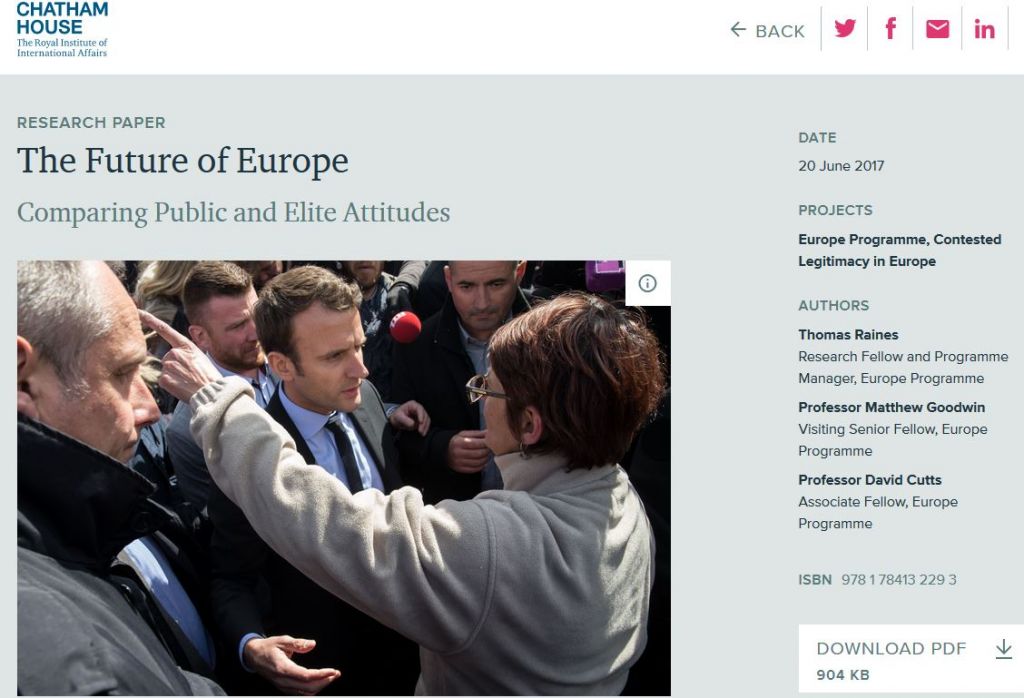Der britische Think Tank Chatham House hat in einer 10 EU-Länder umfassenden Studie das Meinungbild zur Europäischen Union untersucht. Einen besonderen Schwerpunkt bildete dabei ein Vergleich zwischen Einstellungen der „Bevölkerung“ und „Eliten“ – d.h. VertreterInnen aus Politik, Medien, Wirtschaft und Zivilgesellschaft auf lokaler, regionaler, nationaler und europäischer Ebene.
Die ÖGfE hat als Partner des Projekts die EU-Stimmung in Österreich näher analysiert.
Euroscepticism in Austria: the calm before the storm?
Austrians’ attitude towards the European Union is rather ambivalent. The country is located at the core of Europe, has benefited from all major steps of European integration and has weathered the economic and financial crisis comparatively well. At the same time, Euroscepticism has been steadily gaining ground.
Austrians highly appreciate some of the fundamental elements of the EU, such as its role in preserving peace or improving the standard of living through enhanced cooperation. When asked to select the EU’s greatest achievement, 36% of the Austrian sample chose peace on the continent and 36% chose removing borders. They approve some of the most important milestones of European integration, including the euro (34% agree), freedom of movement of people (38% agree) as well as EU membership itself: more than 50 opinion surveys conducted by the Austrian Society for European Politics since 1995 corroborate the view that a comfortable two-thirds majority of Austrians favour staying in the EU. Still, the EU is considered remote and undemocratic, a risk for national sovereignty and a haven for costly bureaucrats and extensive regulation (44%, 23% and 55% agree with these statements respectively). Many doubt that the country or they themselves are benefiting from EU membership. The pains and gains are perceived to be unevenly distributed within society.
The origins of Euroscepticism date back to 1994, when 66.6 per cent of Austrians voted in favour of joining the EU. The successful government campaign to enter raised expectations which could not be easily met, and in the absence of continued publicity and official support for the EU, disillusionment and indifference followed. Perceived price increases following the introduction of the euro as well as the bilateral measures imposed by 14 EU member states following the Freedom Party’s participation in government in 2000 also left a lasting impact. The EU’s eastern enlargement in 2004, where eight new countries joined, of which four were Austria’s neighbours, nourished doubts about the economic benefits of EU integration and raised concerns about competition, particularly in the low-wage sector. Austria’s status as a net contributor to the EU budget also regularly polarizes the public debate. Today, political parties are at loggerheads with each other at the expense of an EU considered aloof and interfering with too many domestic issues.
Despite Austria’s open economy, rated among the world’s most internationalized countries, globalization and liberalization are regarded with suspicion. People are proud of their social and welfare system as well as their high environmental and social standards, which are seen to be under pressure by a deepening drive toward integration and digitalization. Many appear to glorify a seemingly better past.
Politics and business have failed to counter these trends. In fact, quite to the contrary, they have preferred not to contest one-dimensional EU criticism. EU discourse in Austria is marked by its defensive character and approaches to European issues are marginalized by headline-driven politics. It is still considered risky to take a pro-European stance and politicians refrain from highlighting their own involvement and responsibility in European decision-making. It may sound familiar, but in Austria it is the sceptical voices that successfully set the agenda, with the support of a powerful yellow press and their active social media channels.
The public debate on new European free trade agreements restarted the Brussels blame-game. The lack of political involvement at an early stage in debates about TTIP boosted public unease, exacerbating a very emotional debate and polarising viewpoints. Last-minute initiatives to influence the European position were neither promising nor convincing, with Brussels getting the blame.
The Union´s handling of the financial crisis as well as the recent influx of refugees further weakened trust in the EU and politics in general – 24% of Austrians associate the EU with ‘economic crisis’. The heavy burden on Austria – which hosts more refugees per capita than Germany – transformed calls for rapid European action into national activism and harsh border rhetoric, which denounced the EU as incapable. When asked to select the EU’s greatest failure, the refugee crisis came first at 52%.
Finally, the Union’s much-maligned regulatory frenzy is also readily misused for quick political wins. Catchy examples range from the size and shape of cucumbers to the ban of certain light bulbs. The respective myths have deep roots in the public mind and are willingly repeated by opinion-makers. Discussions rarely reflect the fact that most regulation makes sense and is in reality often initiated by member states themselves.
These Eurosceptic views can be countered. The latest Austrian presidential election is a good case in point, where the Brexit vote was successfully transformed into a pro-European electoral agenda. The message was clear: national identity should not exclude emotional ties with Europe but can instead be complementary (67% of respondents said they were proud to be Austrian and European). In uncertain times, Austrians may want to see a different side of the EU but they still prefer to be part of the European family than to stand alone. Despite all the criticism, pragmatism prevails.
Nevertheless, day-to-day politics has not changed. Nationalistic forces are at play in many EU capitals promoting their particular interests while showing rather little European responsibility. The European legal framework is undermined by unilateral approaches, from refugees to bonus payments. Under these circumstances, it should come as no surprise that the EU has difficulties meeting citizens’ expectations. But in the end the Union is just a legal and political framework to align different European interests. It is up to member states to seize this opportunity and look for allies rather than unilateral ventures to achieve their common goals.






